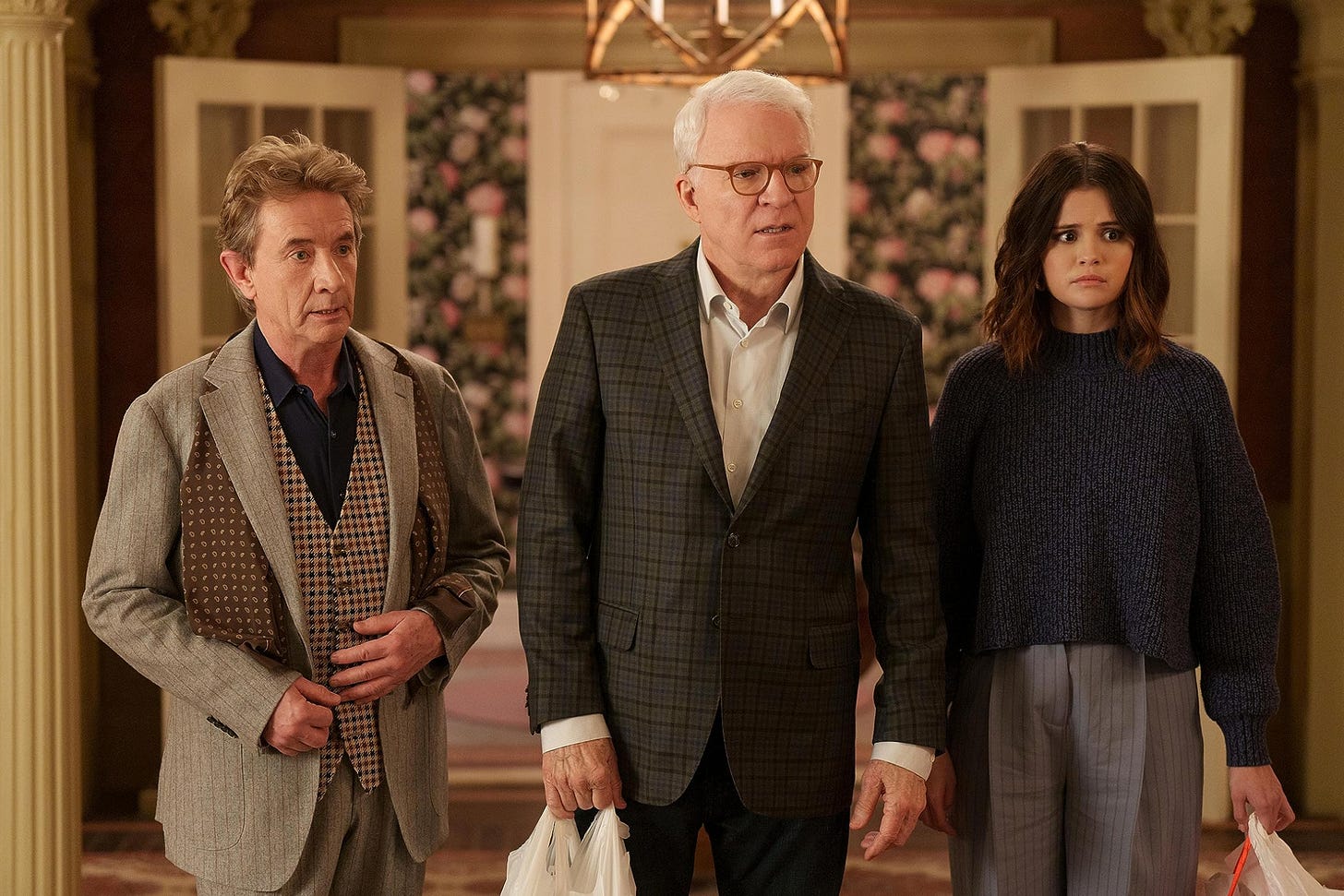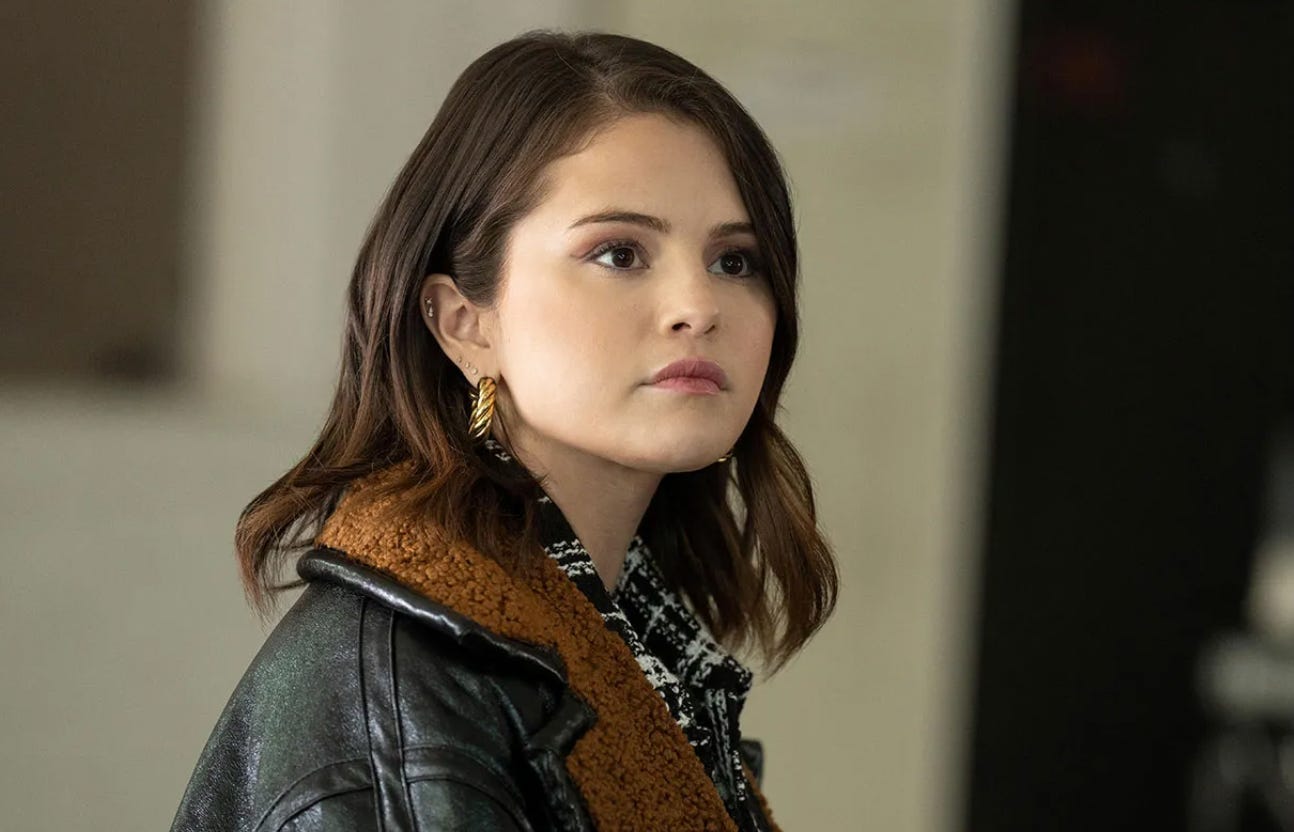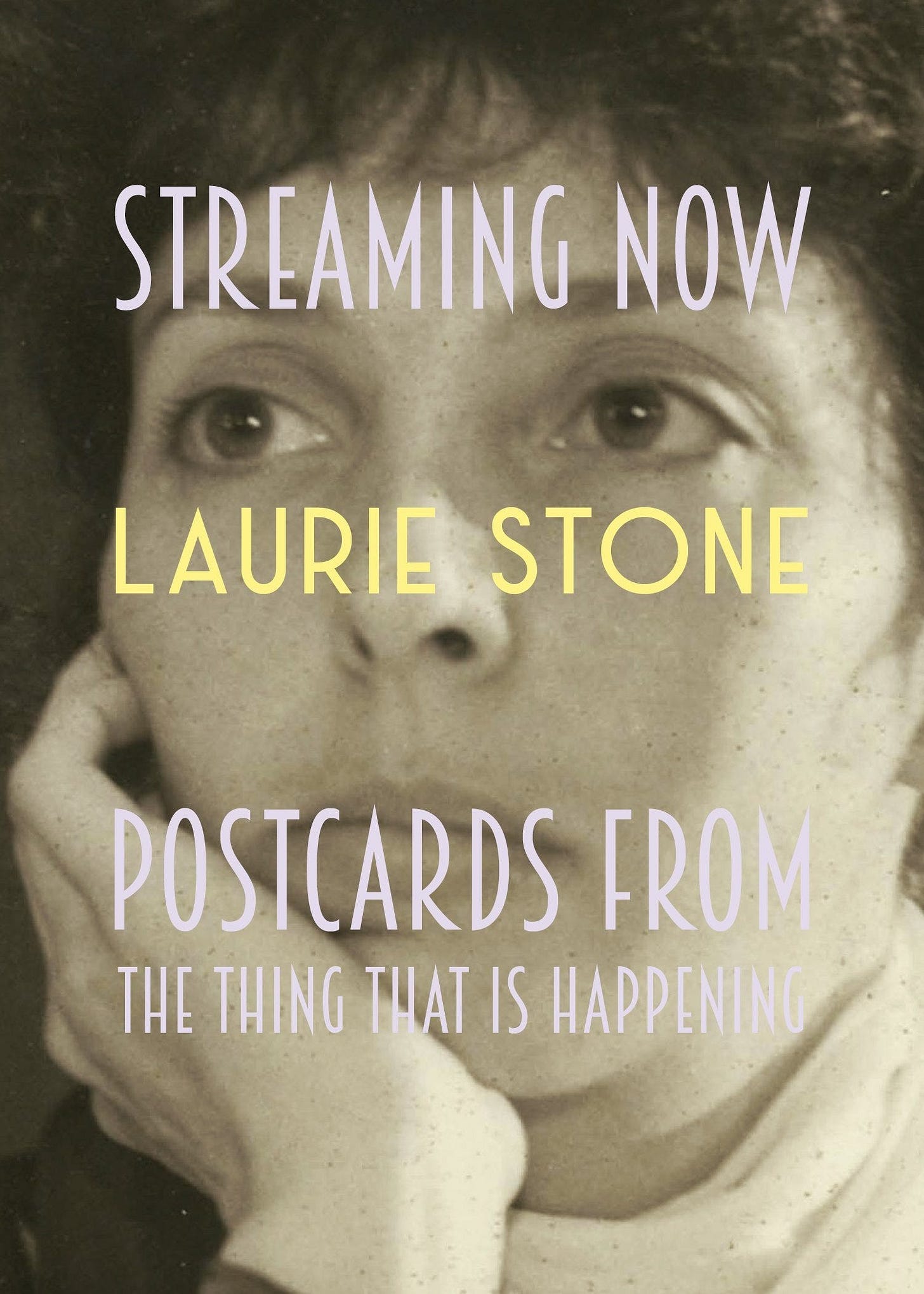Notes On Another New Life #7
Killing It: On Selena Gomez and "Only Murders in the Building"

I’m in love with Selena Gomez. I didn’t know she existed until five minutes ago. I was scraping the bottom of the barrel, I thought, looking for something to binge that would give me a life outside my own life. At the bottom of the barrel, I thought, was Only Murders in the Building. “Please,” said a voice in my head, “don’t make me watch Steve Martin and Martin Short exchange zingers, as if everyone wants to overhear their conversation at the Stage Deli.
Only Murders is deeply enjoyable, and it’s enjoyable because of Selena and her chemistry with Martin and Short—a chemistry that doesn’t care about the fifty years or so that separate their ages. Selena plays Mabel Mora, who is 29 in season one and 31 in the current, season three. Mabel is the same age as Selena herself, and rather like Selena, Mabel floats around in a cloud of weltschmerz that has a boyant, jubilant edge to it. I know, that’s not supposed to be possible, but that’s how odd Selena is in her drive to solve murders or just drink coffee. Her oddness has set the tone of the show. The show is a dog, sitting at her feet, its head turning this way and that, waiting to see what she’ll do next.
How can 29-year-old Mabel, who doesn’t have a job, afford to live in the Arconia, a posh building on the Upper West Side of Manhattan, modeled on the Ansonia and the Belnord, with their expansive, interior courtyards that are public and private at the same time? Her aunt owns it, and Mabel is about to be given the boot this season. It turns out many of the tenants are squeaking by financially, including Short’s character, Oliver Putnam, a once-successful theater director looking for a comeback. Martin’s character, an actor named Charles Haden Savage, has been coasting on residuals from a long-ago cop show. The three, who start out as strangers, are obsessed with a true-crime podcast, and when a resident of their building is murdered, they band together to produce a podcast of their own and to solve the crime.
Dan Fogelman, Steve Martin, and the rest of the writers and producers of Only Murders love their characters, and the love spills out, reminding you why you’re alive. The comedy is silly and slapstick. Short repurposes his character Jiminy Glick, name dropping the famous people he's slept with and the surprising locations where they shtupped. Meryl Street, playing against her real-life self, is an actress who can never get a part. In an extended bit, Martin’s character winds up misplacing a leg he’s accidentally broken off a frozen cat—that kind of slapstick. Have I mentioned I love slapstick?
Each season, someone else in the Arconia has to die. It’s a little like Shetland, whose population has been nearly wiped out by the needs of the police procedural named for the wind-tossed island. In season two of Only Murders, Bunny Folger, the crusty head of the coop board, pegs it, a woman so despised for her officious power over the tennants, I almost missed the sister vampires who owned the building where for forty-three years I trembled in terror of them.
The brilliance at the heart of the show—the pairing of Gomez, who is deadpan and dazed and smart and eye rolling, with the broad comedy daddies Martin and Short—was imagined from the start, and then the show runners learned Gomez wanted the part. Everyone but me knows she’s been a huge pop star, who writes and sings her own songs. In the 2022 doc about Gomez My Mind and Me (Apple TV), co-written (with Paul Marchand) and directed by Alek Keshishian, Selena comes off candid and undefended about her life. She starts working professionally at seven. She has a relationship with Justin Bieber that swallows her in celebrity gray goo. In her early twenties, she’s diagnosed with Lupus, an autoimmune disease that causes painful joint swelling and leads to a kidney transplant. In 2016, during a world tour to promote a new album, she has to stop performing and enters a mental hospital, where she’s diagnosed as bipolar. In the doc, that shows Selena up to age 27, she’s thoughtful and uncomplaining. And by the end, she’s acomplished a wish—establishing a foundation that supports teen education and mental health services.
In season three, her romantic interest is Tobert—“That’s Robert with a T”—played by Jesse Wlliams, who gives the same hot performance here as in all his parts. He can’t help it. He has a Jude Law thing going with his hotness in the sense of his beauty—not in the sense of Jude Law knowing every second he’s beautiful (not that there’s anything wrong with that). Selena and Jesse spark together. In season two, Selena was also hot with her hottie English girlfriend, played by Cara Delevingne. Selena is hot because she’s cool.
People ask Mabel, “So, what’s the deal with you and the old dudes?” Mabel tells them, “They’re my friends,” adding, “I do spend a lot of time explaining how to use the bluetooth.” It’s not only tech advice they need from her. She doesn’t judge them for their failures or boomersplain to them. They see her, too. When she explains to Tobert why she hangs out with these guys rather than with people her own age, it makes you think about what a young woman might gain from such relationships and what they might enjoy about knowing her. They give each other a chance to be new.
Oliver and Charles follow Mabel’s lead in solving the crimes and happily acknowledge she’s smarter than them. They aren’t smarmy with her. They love her without poking around in her business when she doesn’t want them to, and sometimes she does want them to because everyone everywhere is lonely, the show knows, in some deep, urban ‘hood in their psyches.
In a phone interview in 2021, Gomez told New York Times writer Dave Itzkoff, “In real life, if I had met two older men that were into solving mysteries, I would totally bond with them in the same manner.” You feel this. No one is superior. In one sequence, Oliver and Charles doubt that Mabel can speak to people her own age, and she puts on a version of an age-appropriate, 30-something, hipster girl with one hand on a hip and a finger stabbing the air, saying, “Yas, queen.” She hates it. It’s not who she is.
The show holds its breath—all the other actors and even the sets—waiting for Selena/Mabel to explain what others have missed in her slow, wry, I’ve just woken up way. She’s thinking all the time, watchful, a little shy and sad, her voice a wobble and a bird song, lit with the knowledge of life’s uncontrollable forces. The power of some people is they make you wait for the little hit in the morphine drip of them. It’s a funny show about loneliness and the weird ways connection can fall on you, in any combination of ages, like a weather condition or a wolf’s paw.
The past few months I’ve been talking to a young woman, an editor at a magazine I’m writing for, and she’s fifty years younger than me—around the same age difference between Mable and Charles and Oliver. From my side, looking back at her, I see myself looking ahead and yet never looking very far ahead, only arriving each day where I’ve found myself, not planful, not that scared of what can happen to me because I don’t live in a war-torn country or amid some other form of danger.
When I was 28, I didn’t wonder what my life would be like at 76. At 76, I tell my friend I am the same as I ever was. Life has not turned me into a different kind of creature, and I haven’t learned that much, really, except something about writing sentences. The bonus of life isn’t widsom. It’s only more life. And she tells me about being with this kind of boyfriend and then with another kind of boyfriend, and we are having my favorite kind of conversation, two girls with not a lot of concern about how we are understood. It’s this freedom Selena stirs in every frame.
***
Sidebar: Dan Kois's much talked about take-down of Martin Short in Slate is remarkable in the way it shouts for attention—the crime Kois attributes to Short and can't bear. Kois' piece is so weirdly inept, it's a state-of-the-art exhibit of what a ragingly uptight straight white man would make of a male actor who flops about on noodle legs and is drag-queen flamboyant in his look-at-me form of comedy, a form Short also parodies at the same time, which you can't exactly do. Who cares? Short is brainy and often funny. OMG, Kois beats up Short with what he considers the higher comedy of Robin Williams and Adam Sandler. I'm not interested in dumping on anyone, and Short doesn't need me to defend him—I'm not defending him, I'm enjoying him—but beating up Short with Williams and Sandler is like saying, "If you really want meat from a pig, throw out your aged prosciutto and buy a can of SPAM." I know, three Jews and a pork reference.* Bite me.
(*Editor’s note: Robin Williams called himself “an honorary Jew” and we’ve learned that Martin Short, according to reddit, “is 10% Jewish on his manager’s side.”)






MWAAH! I’m absolutely not a kisser but I could throw my arms around this piece--the unexpected turns of phrase, the wit, the deep attention to the show and Gomez in particular (both the character she plays and her real, exceptional self). I don’t often see writing that sparkles and illuminates at the same time, as this does. For what it’s worth, this septuagenarian has learned a fair bit over time. The hard part is acting on what I know. Telling people you love their work is always easy and fun. I’m making up now for compliments withheld when I was younger.
This whole piece is a chef's kiss. Enjoyed every word. Thank you!